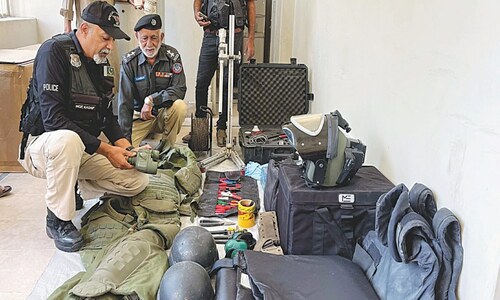
KARACHI: “It is just 30 pages, but it is a very precise booklet,” said Prof Dr Riaz Sheikh, dean of social sciences and education at Szabist during an introduction and discussion about ‘Identity Crisis & Influence of Culture in Development of Thought, Pakistan’, a collection of articles by artist Ali Imam, scholar, journalist and political activist Syed Sibte Hasan and educationist, writer and critic Professor Karrar Husain organised by Szabist on Wednesday.
“Even though the words of these learned gentlemen are a few decades old they are still relevant as they help us revisit a progressive Pakistan instead of this new or ‘Naya Pakistan’ that we have been introduced to,” Dr Sheikh added.
Prof Dr Syed Haroon Ahmed, psychologist and civil society activist, said that he was a witness to the speeches of the three eminent individuals during a Pakistan Psychiatric Society conference held in Karachi in 1981.
“The most interesting part of that conference was its ‘open house’ session as it was not a technical session about mental illnesses but a chance to listen to liberals and progressives,” he said.
Karrar Husain, Sibte Hasan and Ali Imam’s views on culture and identity discussed
“Ali Imam, the painter and promoter of art and founder of the Indus Gallery, spoke on the ‘Identity crisis in Pakistan as viewed by an artist’. Then Syed Sibte Hasan spoke on ‘Influence of culture in development of thought process’ after whom another outspoken intellectual and former vice chancellor of the Balochistan University, Prof Karrar Husain, who was also presiding over the session summed it up with his own observations,” Dr Haroon shared.
“After some 25 years of the conference, I found an audio tape of the session and we at the Society for Secular Pakistan decided to share the proceedings with larger audiences following which the tape was transcribed and reviewed by Saleem Asmi, senior journalist and former editor of Dawn. From here Dr Riaz Sheikh took on the responsibility of its publication into book form,” he said.
About the speeches, he said they were delivered in the era of General Ziaul Haq when Pakistan had become the front-line state in the US-backed ‘jihad’ to push back Soviet forces from Afghanistan. Later, Gen Zia also claimed to have dismantled the Soviet Union.
“Ali Imam traced the revolutionary process of mankind through various phases. The role of art, architecture, sculpture and carvings on stone, provide enough material to discover cultural identity. He emphasised that progressive societies in their evolution have revolted against decadent forces to create new values based on peace, harmony and social justice,” he said.
“Sibte Hasan, picking up from there, dealt with development of thought under the influence of culture. He said that they were not two entities and that the thought process was a part of culture,” he explained.
“And then summing up, Prof Karrar Husain talked about the situation near home. He said that there was a chaos of values, facilitating ignorance, superstition and oppression curbing initiative and entrepreneurship,” he said.
“The two speakers and the chairman’s arguments converged to underscore that stagnant thought process leads to a social formulation, which is not conducive to mental health and progress. The separation of religion from politics and equality of all citizens in the eyes of the state irrespective of their faith, caste or creed, meaning secularism, alone can promise a peaceful and prosperous Pakistan,” he said.
Journalist and civil society activist S.M. Shahid said that the three individuals themselves had no problem in being secular. “And their concern about development of thought made them feel that they had to speak up. Disorder of thinking was something the psychiatrists at the conference also had to think about,” he said.
“Secularism was made to look like something scary by the ruler of the time but it is really a great system and mindset to run a county,” he said.
Sharing her take on the book, scholar and journalist Zahida Hina said that the three individuals were lucky to be speaking to an audience which still possessed an open mind unlike now when people had no tolerance for anything thanks to their closed minds.
About Sibte Hasan, she said that he had been gone for many years now but in his speech he pondered over how a society produced great thinkers and how it produced people who were just the opposite of that. “Pakistan’s culture is said to be specific but the truth is that it is a combination of cultures and languages none of which are thought to be superior or inferior,” she said.
Former senator Taj Haider, who is also a son of Prof Karrar Husain, appreciated the turning of old audio recordings into a book. “When people used to talk about enlightenment they would be made to keep quiet. But cultures cannot be thrust upon people,” he said.
“Yes, we have an Islamic identity, moral values, code of conduct. But there is no fixed reality and laws here should be made after studying the changing realities. Even if you don’t agree with what anyone says, just listen. Because that’s how you keep an open mind and that’s how development of thought is done,” he said.
“My father was a very rational man who despite everything believed that Pakistan had a bright future because he said that people had been made conscious through political thought and consciousness was irreversible. He also said that the women of this country were also part of its bright future. He said that more and more girls here were stepping out of their homes for education and better prospects. He saw it as a very positive change as he said that once they step out they are not going back to silently sit inside those four walls again,” he concluded.
Published in Dawn, April 19th, 2019













































Dear visitor, the comments section is undergoing an overhaul and will return soon.